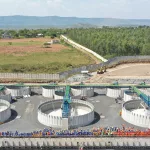The continent has featured prominently on international conference agenda recently, with clean energy transition a hot topic. ABSA Group Chief Strategy and Sustainability Officer, Punki Modise, tells us why.
RECOGNITION GROWING FOR AFRICA CLIMATE ACTION
In recent months, several international conferences have focused on climate change and sustainability, with a particular emphasis on Africa, and they have shed light on the recurring themes at the heart of the discussion. Firstly, there is a growing consensus on the importance of Africa transitioning to cleaner energy. Secondly, there is an increasing optimism about the potential opportunities that climate action presents for Africa. Lastly, there is a strong belief that Africa should not be a mere passenger in climate change matters, but should boldly shape its own response.
The optimism surrounding Africa and its potential in climate change opportunities is well-founded. With an estimated 30-40 percent of the world’s mineral deposits, Africa possesses vast untapped wealth. The ongoing global energy transition presents a unique opportunity for the continent to unlock prosperity from its resources, especially by embracing ESG integration through mineral beneficiation.
MINERALS VITAL TO NET ZERO
Minerals play a vital role in clean energy technologies, and depending on the world’s commitment to net zero, the total mineral demand from clean energy technologies could double or even quadruple by 2040. While crucial for African leaders to prioritise beneficiation as a non-negotiable priority, it is important to acknowledge the potential environmental and social impacts of mining activities. Stringent regulations and responsible mining practices must be in place to mitigate these impacts and ensure sustainability.
While the mining industry has faced increased scrutiny in recent years regarding environmental, social, and governance (ESG) issues, some African nations still struggle with poor governance, posing risks for both the industry and potential investors.
To remain competitive, businesses must strike the right balance between a short-term focus on profitability and the long-term benefits of ESG integration to secure investment. It is essential for African governments to prioritise responsible and sustainable mining practices and collaborate with private sector entities to establish stringent regulations, industry best practices, and transparent reporting mechanisms.
GHANA AT THE FOREFRONT OF SUSTAINABLE MINING
However, it is encouraging that several African countries have made notable progress in promoting sustainable mining practices and attracting investment through ESG integration. For instance, Ghana stands out for implementing the Ghanaian Mining and Environmental Guidelines, while South Africa has integrated ESG principles through its Mining Charter, and Namibia is enforcing sustainable mining practices through its legal framework.
Despite these achievements, continued collaboration between governments, mining companies, and stakeholders will be vital to address challenges, monitor progress, and sustain the positive impact of ESG integration. However, these global gatherings have identified several daunting challenges that lie ahead for Africa’s transition.
AFRICA’S RISK PERCEPTION
The first challenge is the perception of risk associated with Africa, which significantly impacts the cost of capital and hampers the continent’s transition ambitions. With a staggering 93 percent of African countries rated as sub-investment grade, Africa lacks the necessary fiscal space to finance its own transition.
Secondly, energy insecurity also remains a concern, with approximately 600 million people lacking access to electricity, according to the African Development Bank. While renewable energy sources are crucial, the continent faces challenges due to the highly variable nature of wind and solar power and the absence of nuclear power and less reliable hydroelectric power. Consequently, Africa will continue to use its abundant energy resources, both renewable and non-renewable, to meet energy demands.
But businesses and governments must prioritise renewables as an immediate and vital solution rather than a distant future project for Africa’s sustainable energy transition.
Thirdly, there is the perceived lack of effective coordination among African policymakers and decision makers. This severely hampers the continent’s ability to effectively scale its climate change response actions. It is crucial for African governments to prioritise collaboration and establish platforms to share knowledge, align strategies, and coordinate efforts.
ESG DATA SETS MUST IMPROVE
There is a pressing need for credible, standardised and verified data to measure the impact of ESG efforts and enable ESG investment. New mining projects require comparable, factual, and verified data sets. Collaboration between private and public entities is crucial in establishing appropriate ESG data collection, analysis, and best practices. Internationally recognised ESG performance frameworks, such as those from the Global Reporting Initiative and the Sustainability Accounting Standards Board, can provide a foundation for this process.
Recognising the African Continental Free Trade Area (AfCFTA) as a unique opportunity, Africa can address the challenges of finance, ineffective coordination, and scale its climate change efforts. By integrating ESG considerations into African trade policies, AfCFTA can serve as a platform for regional cooperation and harmonisation of policies, and encourage businesses to adopt sustainable practices, promote data transparency and standardisation.
Addressing the challenges of ESG requires collaboration between public and private entities. Effective collaboration means working together to set clear ESG goals and targets.
Governments can incentivise companies through policy frameworks that include regulatory measures like tax incentives, grants, subsidies, and favourable business regulations, and mandate ESG data disclosures using standardised reporting frameworks. Public-Private Partnerships (PPPs) are also valuable for joint ESG initiatives, enabling the sharing of resources, expertise, and funding.
By implementing these strategies, governments and private sector entities can foster effective collaboration, driving positive ESG practices and contributing to sustainable development.





















